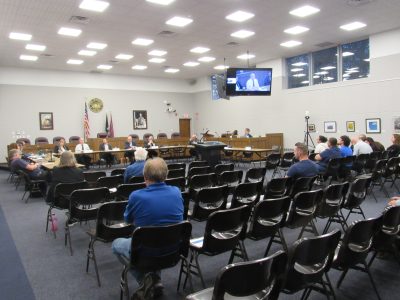Holtec Lawsuit Stalls Indian Point Cleanup
News Based on facts, either observed and verified directly by the reporter, or reported and verified from knowledgeable sources.

By Abby Luby
A legal battle over radioactive wastewater being released into the Hudson River is delaying the final cleanup of the shuttered Indian Point nuclear power plant — and fueling growing frustration among residents and officials.
Wastewater with the radioactive isotope tritium being discharged into the Hudson River at the closed Indian Point nuclear power plant was an issue raised at the May 1 Indian Point decommissioning board meeting. Tritium is a radioactive isotope that emits low-level radiation and, if ingested or absorbed in significant amounts, has been linked to an increased risk of cancer.
The Indian Point nuclear power plant was shuttered in 2021 after operating for 60 years. Holtec International was tasked with the cleanup of all three reactors on site.
In December, 2024, a New York State inspector overseeing the Indian Point decommissioning reported to the decommissioning board (DOB) that Holtec was pumping radioactive water leaking from the oldest reactor, unit 1, into the Hudson River.
The report verified what had been known since 2023, and which prompted Governor Kathy Hochul to sign the “Save the Hudson” bill into law, making it illegal for Holtec to discharge water with radiological substances into the Hudson River in connection with the decommissioning project.
Holtec countered in April 2024 by filing a lawsuit, arguing that state rules regulating the discharge of radioactive materials from nuclear power plants have no authority and that oversight of such discharges belongs solely to the U.S. Nuclear Regulatory Commission (NRC), not the state of New York. The lawsuit is currently pending in the Southern District Court of New York.
At the May 1 DOB meeting, Westchester County Legislator Emiljana Ulaj questioned Holtec spokesperson/Indian Point Site Vice President Frank Spagnuolo about the release of contaminated water into the Hudson.
“How often is Holtec releasing water into the Hudson and is the water being tested?” Ulaj asked. “What is in it? What is it being contaminated with?”
Spagnuolo offered a lengthy explanation about techniques used to handle groundwater leaks, adding, “The entire discharge of radioactive waste is under the civil courts and there is very little I can discuss.”
He advised Ulaj to read the Holtec annual report for specific details.
Sen. Peter Harckham (D-Lewisboro) who attended the DOB meeting via Zoom said “sometimes litigation takes a long time before it is resolved. It’s a logistical thing we are going to have to navigate.”
Holtec has asserted that the “Save the Hudson” law is delaying the Indian Point decommissioning completion by eight years. The original target end date of 2033 has been pushed back to 2041.
Holtec is no stranger to long-term litigation and regional pushback.
In July 2024, Holtec’s request to dump more than a million gallons of radioactive wastewater from the Pilgrim Nuclear Power Station into Cape Cod Bay was denied by the state of Massachusetts. Holtec, which is overseeing the plant’s decommissioning, appealed the decision, and court proceedings began in January 2025.
Holtec is also handling decommissioning projects at Oyster Creek Nuclear Generating Station in New Jersey, Palisades Nuclear Plant and Big Rock Point, both in Michigan.
Currently Holtec is operating from an Indian Point Decommissioning trust fund of almost $2 billion. Any funds left over after paying for the decommissioning is Holtec’s profit. Pending litigation involving Holtec could prolong or stall the final cleanup of Indian Point, allowing Holtec’s trust fund to continue growing during that time.
Different radioactive water storage systems were suggested to Holtec in order to avoid discharging radioactive water into the Hudson River, according to Riverkeeper outside counsel and DOB board member Richard Webster.
“We have suggested storing the water in other places such as large storage tanks that could be on site,” Webster said. “It would require careful construction that would be resistant to seismic activity and last for about 24 years. But Holtec pushed back on storing tanks.”
Verplank resident Christopher Vargo also commented at the May meeting. Vargo, who previously criticized the discharging of radioactive wastewater into the Hudson, cited multiple reasons why members of the DOB should resign.
“It (is) abundantly clear that the DOB is a complete failure,” Vargo said. “From the continuing discharge of radioactive water into the Hudson River to the lack of an economic development plan.”
Vargo went on to blame DOB chair Tom Congdon for creating a culture of appeasing Holtec and called for his resignation, as well as the resignations of other DOB elected officials whom he accused of favoring Holtec over the local community.
“Any changes that have come about, such as the ‘Save the Hudson Bill’ came about because of pressures from the public,” Vargo told the board. “The DOB is not doing what is right for the public. They use their position to convince the public that what they are doing is right.”
Vargo also asked the DOB to add representatives from the nearby Hendrick Hudson School District and local first responders to the board.
“That,” Vargo said, “would be helpful.”

Abby is a seasoned journalist who has been covering news and feature stories in the region for decades. Since The Examiner’s launch in 2007, she has reported extensively on a broad range of community issues. Read more from Abby’s editor-author bio here. Read Abbys’s archived work here: https://www.theexaminernews.com/author/ab-lub2019/
